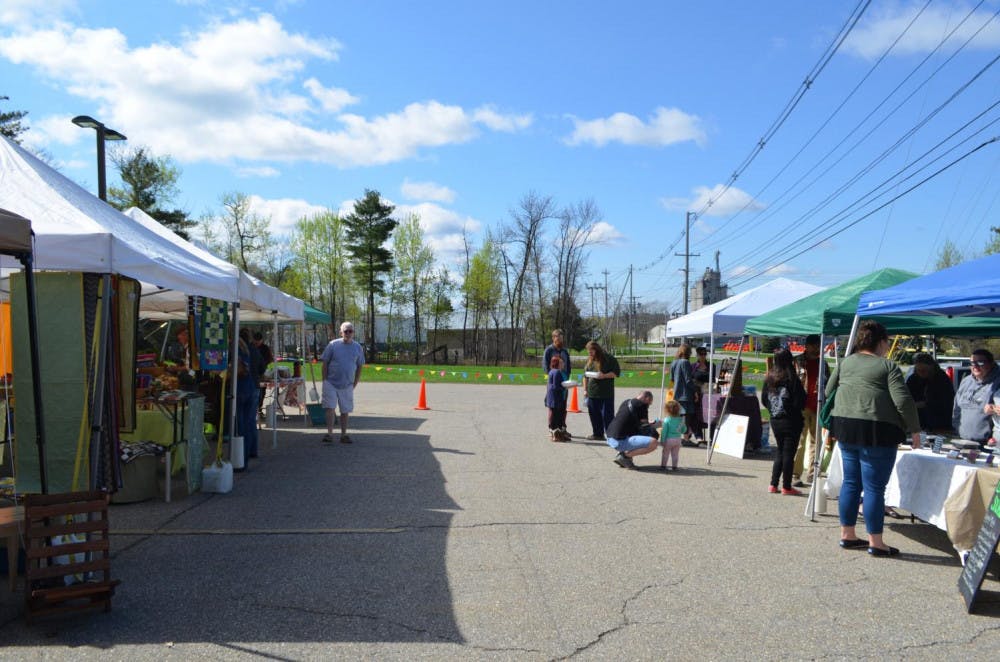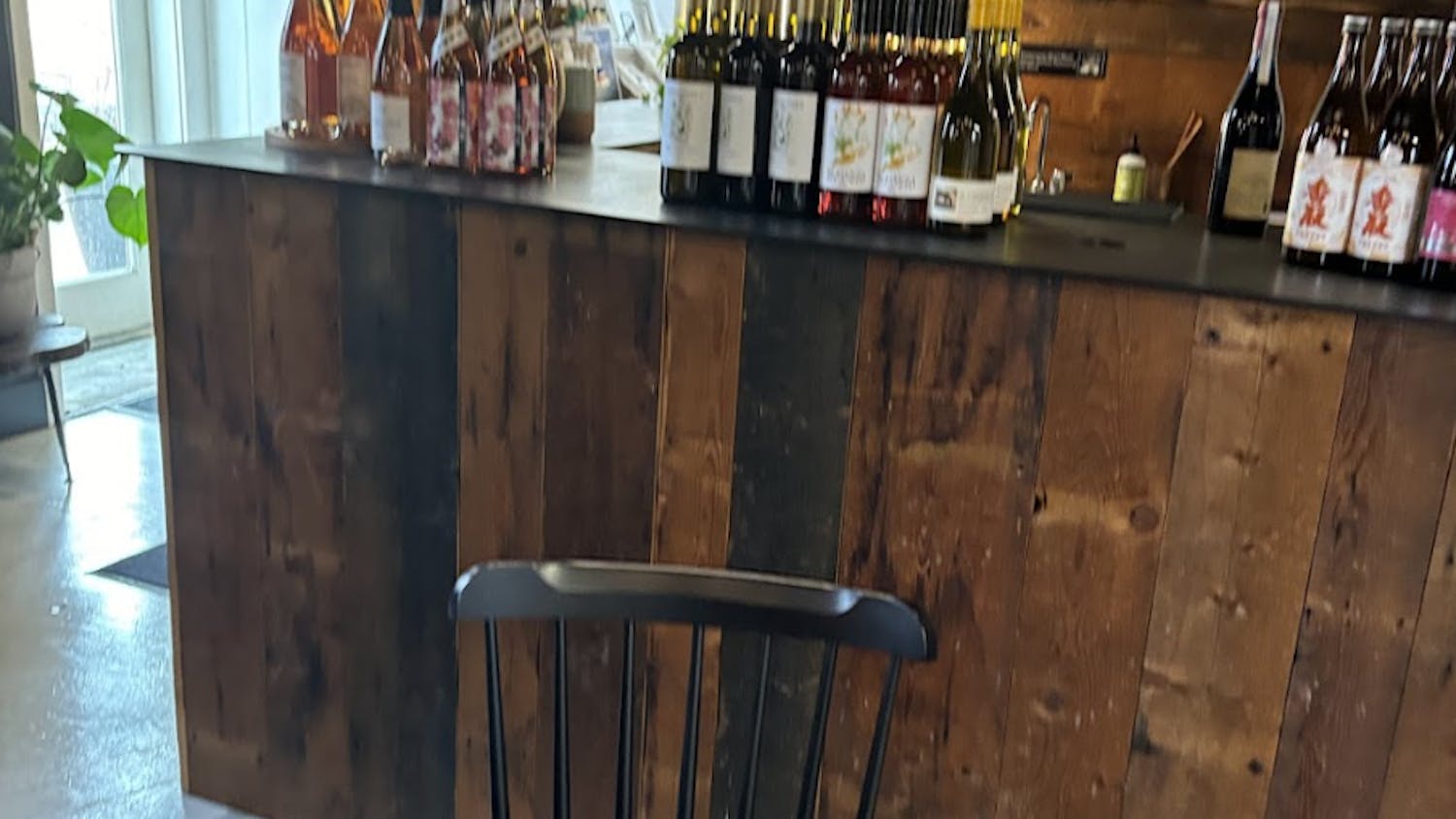[gallery ids="39020,39021,39022,39023,39024"]
The Middlebury Farmers’ Market (MFM) started its summer market season last Saturday, May 5, featuring a variety of products including fresh produce, prepared foods and other Vermont crafts. This year’s outdoor summer market will run every Saturday and Wednesday morning from 9:00am to 12:30pm until Oct. 27. The Middlebury Farmers’ Market is especially known for its variety in organic vegetable and dairy items.
The summer market, unlike in the winter season, is held outdoors and offers a wider variety of different products. The summer season also brings musicians and special events such as the Grand Opening on May 26, Dairy Day on June 16, Red White and Blue Day on July 7, and the Harvest Festival on Oct. 13. This year’s summer market has also reached out to community partners for more special events like Homeward Bound’s meet and greet with dogs up for adoption this past Saturday.
While MFM was previously located at Marble Works, the ongoing rail bridge construction project led to a permanent relocation last summer to 530 Exchange Street, a less visible location from downtown Middlebury. “It’s a shame that there isn’t more interest from the city and downtown retailers to support a more centrally located Farmer’s Market,” said Laura Quill of Quill Hill Farms about the new location.
Though the past location was more easily accessible to pedestrians, the market has worked to make both parking and biking easier at the center for Veterans of Foreign Wars (VFW). “The VFW does have its advantages,” said MFM’s promotions and outreach liaison Elisabeth Woronzoff. “More space for more vendors, a beautiful green space to sit and enjoy the event, easy access to an ATM, a new and improved parking methodology and access to other great businesses located on Exchange Street.”
 BENJY RENTON
BENJY RENTON
Still, MFM remains a significant component of Middlebury’s community. “Addison County is so rich in resources that our market can offer an amazing assortment of fruits and vegetables, cheeses, meat, breads, crafts, and other products,” Woronzoff said. “The vendors are also creative and interested in experimentation, so you never really know what products are available until you stroll through their offerings.”
For instance, Quill Hill Farm tries to stand out in the market by offering a more unusual variety of vegetable products, including unique heirloom tomato starts, mixed purple green beans, spicy chili peppers, and distinctive garlic powders. “Our garlic powders are also unique in that they are a small batch made using a blend of eight varieties of garlic where some are spicier or sweeter,” said Quill. “We also dehydrate at lower temperature than traditional commercial garlic powders, which gives our powder a really deep, fresh flavor that you don’t get from garlic powder in the store.”
Woronzoff said that MFM is unique because “our vendors are also willing to collaborate with each other and other businesses in town. Having our vendors come together to show how their products work together is a key element to engaging customers.”
For some farms like Quill Hill Farm, MFM is crucial because restaurants and co-ops typically pay only 50 percent of the cost of the wholesale product, while the farm can sell to customers at full price at markets. Their sales at markets comprise half of their income. The market is also an opportunity for farms to expose tourists to their unique products, which can aid in progress toward online purchasing. However, selling at the farmer’s market does not come without its challenges.
 BENJY RENTON
BENJY RENTON
“One of the largest struggles we face here in Vermont with the Farmers’ Market is population size. Vermont just doesn’t have a lot of people, so while you as a farmer can produce tons of food, selling that food is difficult,” said Hill. “It’s also a struggle to figure out supply and demand of products/what customers will want that week. It’s often a guessing game which makes it especially challenging when your product is so perishable.”
Beyond the business, farms still consider the farmers’ market a rewarding venture. Hill said, “ I love talking to customers and sharing farming stories and educating people on growing organically.” The market provides an opportunity for vendors to interact directly with their customers and to share growing techniques and farming philosophies, Hill explained. “At the market we swap recipes with customers, see babies grow bigger, share in sadness and triumphs of life, learn all sorts of new things, and simply enjoy getting off the farm for a few hours a week being a part of a like-minded community.”
The MFM has also impacted individuals in the town of Middlebury beyond its farmers by bringing in many people from outside the town, who then stay for activities and events around town. “Essentially, the Middlebury Farmers’ Market contributes to the local economy and acts as a community hub,” said Woronzoff. “But the market also impacts more than the town, it has a huge impact on the county as well. Our vendors are from across the county, thereby creating an interconnection across sweeping farmland. That interconnection is an advantage for the town but then expands even further across the county. Our emphasis is on the local and that supports the individual and the collective.”
Woronzoff is also excited about the future of MFM and hopes to see it continue to expand and evolve. “Whether that means doing more outreach with community partners, hosting more vendors, or offering an even greater variety of products,” said Woronzoff, “the market must grow to ensure the success while contributing to our local economy.”




